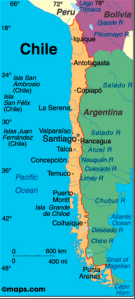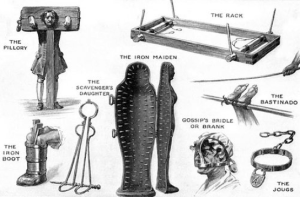-
the shrinks were in on it? we need to talk about torture again. and again. and again.
 I am disgusted. A few months ago, my mom wrote a post about the Senate Intelligence Committee’s torture report, imploring us all to not let our outrage with the government-sponsored (ineffective) “intelligence-seeking” barbarities fade with the news cycle. A new bombshell released last month makes her call to action even more salient. The American Psychological Association not only participated in this program, they changed the wording of their ethics code in order to do so.
I am disgusted. A few months ago, my mom wrote a post about the Senate Intelligence Committee’s torture report, imploring us all to not let our outrage with the government-sponsored (ineffective) “intelligence-seeking” barbarities fade with the news cycle. A new bombshell released last month makes her call to action even more salient. The American Psychological Association not only participated in this program, they changed the wording of their ethics code in order to do so.It’s one thing for our government to commit these atrocities – governments are no strangers to using lethal force to achieve their goals – it’s quite another for the governing body of a “helping profession” to collaborate in any way with a program that seeks to debase the human body and soul for any purpose. This scares the shit out of me. (If you want to see how the APA is dealing with this, click here.)
I’ve lived in many places where the government’s use of torture wouldn’t even make headline news. Not because it doesn’t exist – because it’s not news. Spending time in Sudan, Zimbabwe, Congo and other places where human rights abuses are justified in the name of protecting the State, it’s easy to feel a little smug as an American. We have the rule of law. We have certain ethical lines we do not cross. We have a transparent government where leaders are elected and defeated according to the will of the people. And of course all of these things are mostly true when compared to most of these countries. But the line that separates “us” from “them” gets thinner and thinner until it vanishes with the use of torture.
 I first encountered this discussion of state-inflicted torture when I was studying in Chile my junior year in university. I wrote my thesis about the aftermath of the CIA-supported coup that toppled the socialist Allende government and installed the capitalist-friendly, authoritarian Pinochet government. In my research, I stumbled upon a psychotherapist named Lucy. Lucy ran a social service agency to treat torture victims. Over a series of lunch and coffee dates she described to me what her patients confronted in dank, dark prisons during their “interrogations.” The techniques were almost identical to the ones the CIA used (or still uses??) post-September 11th.
I first encountered this discussion of state-inflicted torture when I was studying in Chile my junior year in university. I wrote my thesis about the aftermath of the CIA-supported coup that toppled the socialist Allende government and installed the capitalist-friendly, authoritarian Pinochet government. In my research, I stumbled upon a psychotherapist named Lucy. Lucy ran a social service agency to treat torture victims. Over a series of lunch and coffee dates she described to me what her patients confronted in dank, dark prisons during their “interrogations.” The techniques were almost identical to the ones the CIA used (or still uses??) post-September 11th.Now, in Chile’s case, Allende supporters were deemed worthy of torturing to get information about other political organizers and activists. If a neighbor ratted you out for having a political pamphlet on your mail table, you would be arrested and detained, sometimes for years, and subjected to these “enhanced interrogation” practices. The threat of socialism was so great, you see, that getting information about underground political operators by any means necessary was crucial to state security. It’s easy to really go nuts with the testicle electrodes when we imagine our victim as an al Qaeda troglodyte thrusting his AK-47 towards the heavens in a celebration of glory in the wake of the mass killings in New York. How about if our victim is a Chilean philosophy student who believes in free milk for children?
 Yes, free milk for all Chilean children under the age of five was one of Allende’s subversive promises as president. (I know, what an asshole! Free milk for children! Those dirty socialists.). Such a promise relied on a massive logistical operation involving trucks and truck drivers delivering milk all over the country every day. In order to foment unrest, and make Allende look weak and ineffective, the CIA orchestrated truck driver strikes and convinced American companies like Ford to stop selling truck parts to Chile. Soon there was no one to drive the trucks and when the trucks broke down, they couldn’t be fixed. Sorry, kids. No milk.
Yes, free milk for all Chilean children under the age of five was one of Allende’s subversive promises as president. (I know, what an asshole! Free milk for children! Those dirty socialists.). Such a promise relied on a massive logistical operation involving trucks and truck drivers delivering milk all over the country every day. In order to foment unrest, and make Allende look weak and ineffective, the CIA orchestrated truck driver strikes and convinced American companies like Ford to stop selling truck parts to Chile. Soon there was no one to drive the trucks and when the trucks broke down, they couldn’t be fixed. Sorry, kids. No milk. But I digress. Let me take you back to Lucy and our cups of tea. By the time I got to Chile in 1996, Chileans were desperately trying to get on with their lives and forget the past. Now, to be fair, there were many Chileans who couldn’t actually remember the past because they’d been so blasted by electrodes and trauma that they had serious mental health issues. One of my study abroad friends lived with a family with an uncle who they described as “not there” in the head. It turns out he’d been a university student interested in something really wild like the right to vote, and he’d been detained for several months during the unrest. I really don’t think the family ever asked him what happened.
But I digress. Let me take you back to Lucy and our cups of tea. By the time I got to Chile in 1996, Chileans were desperately trying to get on with their lives and forget the past. Now, to be fair, there were many Chileans who couldn’t actually remember the past because they’d been so blasted by electrodes and trauma that they had serious mental health issues. One of my study abroad friends lived with a family with an uncle who they described as “not there” in the head. It turns out he’d been a university student interested in something really wild like the right to vote, and he’d been detained for several months during the unrest. I really don’t think the family ever asked him what happened.One of the reasons this family and others didn’t ever talk about it was primarily that they were fucking petrified of the government, and also, odds were that it was their neighbor who had ratted him out. Since most people didn’t have the money to move houses, every neighborhood was a patchwork of snitches and torture victims, living side by side, trying to pretend like everything was normal. I know this “neighborhood watch” (or, as they call them in Cuba, Committees for the Defense of the Revolution) is common in many oppressive countries, but it really freaked me out in Chile because I was welcomed into so many homes and could never tell which side my hosts would’ve been on.

Actually this pattern of torture then trying to white wash the record of torture is quite common – there’s a version of it in most Latin American countries with similar histories. I discovered a Uruguayan poet named Rafael Courtoisie while I was doing my research. In response to his own country’s attempts to completely obliterate their collective memory of what their government had done to its own people he wrote:
The elephants all come together to forget. All but one.
This forgetting is bolstered by the intentional use of vague terminology like “enhanced interrogation” and the participation of respected professional societies to legitimize government actions. (I’m talking to you, APA.)
 Anyway, Lucy’s problem was the same as anyone’s running a non-profit social service agency anywhere at any time in the history of the world: funding. The government had initially set up her agency as part of the Truth and Reconciliation process. It seemed only fair that the government would pay for treatment since they were the ones to fuck up all of these people in the first place. There’s a certain symmetry in this, right? “We’re sorry we tortured you. Here, talk to a shrink. It’s on us!” You would also think that such a program would have widespread popular support. But it didn’t. We’re not the only ones to let torture fade from the headlines.
Anyway, Lucy’s problem was the same as anyone’s running a non-profit social service agency anywhere at any time in the history of the world: funding. The government had initially set up her agency as part of the Truth and Reconciliation process. It seemed only fair that the government would pay for treatment since they were the ones to fuck up all of these people in the first place. There’s a certain symmetry in this, right? “We’re sorry we tortured you. Here, talk to a shrink. It’s on us!” You would also think that such a program would have widespread popular support. But it didn’t. We’re not the only ones to let torture fade from the headlines.Lucy said that she had to fight for every peso she got, and that she couldn’t broadcast how much she was getting or she might lose it altogether. As a rapidly developing country, Chile had a lot of sectors elbowing for government funding: the burgeoning tech industry, breast cancer research, downtown high-rises, etc. So, the Chilean government was trying to make reparations through funding this treatment program, but they didn’t want anyone to know about it. This made it very difficult for Lucy to recruit patients. This also made it difficult for me to understand how there’s ever justice in the world for anything.
What is my point? My point is that once torture is socially acceptable, it becomes mundane. Just another issue competing for our limited bandwidth. But there’s nothing mundane about it!
 When we think about torture, those of us living in politically-stable countries assume that the head dunkers are always the good guys, and the guys getting their heads held under the toilet water for several minutes at a time are always the bad guys and that a universal moral code surely must pervade. In the case of the CIA program, for instance, it’s easy to reassure yourself that in order to be in Guantanamo or a secret prison in Yemen you must have done something worthy of a little rough handling, right? History has shown, again and again, that this isn’t the case.
When we think about torture, those of us living in politically-stable countries assume that the head dunkers are always the good guys, and the guys getting their heads held under the toilet water for several minutes at a time are always the bad guys and that a universal moral code surely must pervade. In the case of the CIA program, for instance, it’s easy to reassure yourself that in order to be in Guantanamo or a secret prison in Yemen you must have done something worthy of a little rough handling, right? History has shown, again and again, that this isn’t the case.Reading the list of who was tortured, disappeared and/or killed in Chile during their period of political oppression, you can see their occupations: teacher, truck driver, housewife, journalist, electrician, public employee, lawyer, agricultural worker. In other words: us. People like us were the enemy of the state. People like us were tortured because that was the legitimate way to handle enemies of the state at that time in that place.
 Once torture is on the table as an accepted tool for governments to use to get what they deem as vital, life-saving information, there’s nothing protecting any of us from being victims of state-administered torture if whoever in power decides that we are the enemy. You can’t support the use of torture with the condition that it’s only for causes you agree with. Either it’s accepted or it’s not. If it is, whoever is in power gets to decide the legitimate uses.
Once torture is on the table as an accepted tool for governments to use to get what they deem as vital, life-saving information, there’s nothing protecting any of us from being victims of state-administered torture if whoever in power decides that we are the enemy. You can’t support the use of torture with the condition that it’s only for causes you agree with. Either it’s accepted or it’s not. If it is, whoever is in power gets to decide the legitimate uses.Of course this entire argument ignores the fact that research has proven that prisoners in undue extreme circumstances don’t give reliable answers anyway. Which reminds me of a Sociology of Crime course I took at the University of Texas. The professor said research shows that, paradoxically, the more innocent a suspect under intense interrogation is, the more likely they are to lie. They figure that since whatever they say is a lie, it will be easily disproven, and so whatever it takes to get out of the room and be able to go home, they’ll say. In some cases that means confessing to a crime they didn’t commit – if you know you were at a party with a ton of people who saw you when the murder happened across town, then it seems impossible that your “confession” will ultimately be accepted. I’m ignoring this research not because I don’t believe it – I do – but because I see it as irrelevant. Once we accept torture as a legitimate government tool, it’s out of our hands which government uses it for which reasons. I hope you agree.
 Now, I hate it when people tell you about something you should get angry about and then don’t tell you what you can do to convert your anger into action, so here are a few suggestions:
Now, I hate it when people tell you about something you should get angry about and then don’t tell you what you can do to convert your anger into action, so here are a few suggestions:- If you’re a psychologist, follow the APA’s progress with the independent report they promised in the first quarter of 2015 – write to ask about it and, if and when it’s released, make your concerns known to them.
- Support Physicians for Human Rights in their efforts to eliminate torture through donating money or writing letters and signing petitions when they ask you to.
- Write to your Senator and/or Congressperson telling them not to fucking forget the torture report and following up on those who need to be sanctioned.
- Tell me if there’s something else I can list!
***Update from 5/30/15*** A friend who is familiar with the APA told me the following:
The psychology torture “advisors “ were known to the organization during the Abu Ghraib fiasco. At the time, a sizable group of APA members who were part of Division 39 (the analytic wing of the APA) took an active & vocal role in protesting the role of the torture advisors. I don’t know if they remained active but I did attend a seminar related to this issue about 8 years ago. There are some mensches!





Hi Caitlin,
Damn fine piece. What could be next? Surely not the Catholic Church’s role in developing tortures and consistently supporting America’s wars?
Keep it up.
Warmly,
Paul
Thank you, Paul. It really does feel like (please excuse me in advance for using this cliche) nothing is sacred.
Congratulations Caity This is your best post ever.It is important to keep the light shining into dark corners Peter
Sent from my iPhone
>